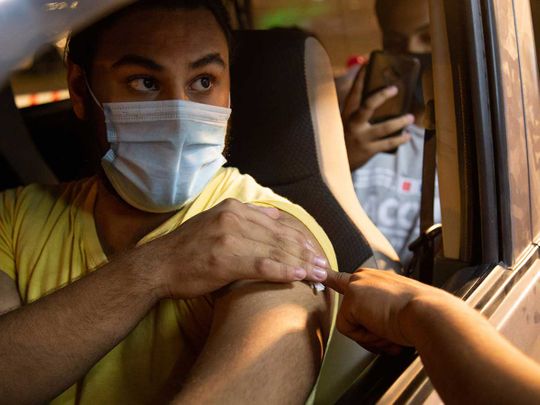
Just when Pakistanis had started to heave a sigh of relief from the fears of COVID-19 causing havoc and the government had started to congratulate the nation for successfully tiding over the health and economic challenges posed by the deadly virus, officials have been forced to tamper the joy with warnings of a fourth wave.
A range of measures are again in consideration to improve vaccination levels and to build collective immunity. These include making inoculation mandatory for job interviews, air travel and for those above 18 years of age.
Prime Minister Imran Khan has issued a request to the people to keep their guard up while the National Command and Operation Center (NCOC), the lead policy and strategy body dealing with the pandemic, has spoken of the arrival of a more virulent and mutation-savvy Delta Virus strain.
The new strain has been detected in some of the main cities and this has the experts sweating at the prospect of its likely spread. Because of its different symptoms (more like flu with cough) it can stay under an individual’s health radar.
Major upset in precautionary measures
Also, global examples suggest that this spreads faster in communities that have lower immunity and vaccine levels and can cause major upsets in health-related protective and precautionary measures.
“...laxity (in observing general guidelines) could have serious consequences”, media reports cited NCOC officials warning the nation last week. The new variant combined with worries of another flow of the pandemic has also forced authorities to quicken the pace of vaccinating the public.
Pakistan’s vaccination record has improved but it is still not at par with internationally-recognised standards of satisfactory performance. So far only 18 million doses of (mostly Chinese) vaccinations have been administered, which in a population of 220 million isn’t a reason to feel reassured about effectively countering virus’ new attacks.
The other challenges relate to the public’s own attitude towards the pandemic. There is violation galore all around. From gyms to beauty parlours to shopping malls to tourist sites, every place is teeming with people, where the smallest percentage bothers to wear a mask.
Hand-sanitisers sales have plummeted as even basic measures like ensuring handwashing routines are not adhered to.
The upcoming Eid Al Adha’s preparations have further loosened public discipline to help fight the fears of a fourth wave through responsible social behaviour.
The sale and purchase of sacrificial animals, while regulated in the main cities by the respective administrations, is going on without any sense of separation from the herds and social distancing between the humans.
Restrictions to be relaxed
The government’s hands are also tied by some of the steps that itself had announced a few weeks ago that allowed businesses to open and restrictions to be relaxed.
With the economy in desperate need of a sustained momentum and the business class, from big exporters to manufacturers to most of the services sector operators, constantly demanding “unrestrained space” to carry out their activities, the government had to open up the locks on movement of goods, people and commercial activities.
Now that this has happened, official warnings about the possibility of restrictions getting reimposed are not being received well.
In sectors like education, the government finds itself in a fix. Last week the federal minister for Education, Shafqat Mehmood, landed himself in a tight spot defending the government’s move to conduct exams in spite of now officially-endorsed concerns about COVID-19’s fourth wave.
Hours before the government put out the warnings, many official functions were held apart from election rallies with large number of people in attendance. Not many were wearing the masks at these event.
But somehow these complex challenges have to be dealt with even though no action is without political and economic cost.
The surest way to avoid the on-again-off-again policy of restrictions that the tricky virus forces on the policymakers is to significantly improve vaccination levels.
It is only when the majority of the nation has been protected by the vaccine that policies can become steady and the public can be guided to have a workable game-plan for their businesses, jobs and health.
Where things stand today, Pakistan has a distance to cover to reach that point.
Syed Talat Hussain is a prominent Pakistani journalist and writer. Twitter: @TalatHussain12







